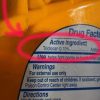 ACPS works to provide safe and fragrance-free soap through dispensers in restrooms and staff workroom areas. The Food & Drug Administration (FDA) recently banned several antibacterial active ingredients found in antibacterial soap—triclosan and triclocarban are the most common. Manufacturers are no longer allowed to use these ingredients in antibacterial soap; however, soaps produced before the final rule may contain the banned ingredients.
ACPS works to provide safe and fragrance-free soap through dispensers in restrooms and staff workroom areas. The Food & Drug Administration (FDA) recently banned several antibacterial active ingredients found in antibacterial soap—triclosan and triclocarban are the most common. Manufacturers are no longer allowed to use these ingredients in antibacterial soap; however, soaps produced before the final rule may contain the banned ingredients.
Please refrain from bringing antibacterial soaps to school. If you are in need of a soap dispenser in an area, please contact your lead custodian.
Additional Information on FDA’s Antibacterial Soap Rule
According to the U.S. Food and Drug Administration (FDA), there isn’t enough science to show that over-the-counter (OTC) antibacterial soaps are better at preventing illness than washing with plain soap and water. To date, the benefits of using antibacterial hand soap haven’t been proven. In addition, the wide use of these products over a long time has raised the question of potential negative effects on your health.
After studying the issue, including reviewing available literature and hosting public meetings, in 2013 the FDA issued a proposed rule requiring safety and efficacy data from manufacturers, consumers, and others if they wanted to continue marketing antibacterial products containing those ingredients, but very little information has been provided. That’s why the FDA is issuing a final rule under which OTC consumer antiseptic wash products (including liquid, foam, gel hand soaps, bar soaps, and body washes) containing the majority of the antibacterial active ingredients—including triclosan and triclocarban—will no longer be able to be marketed.